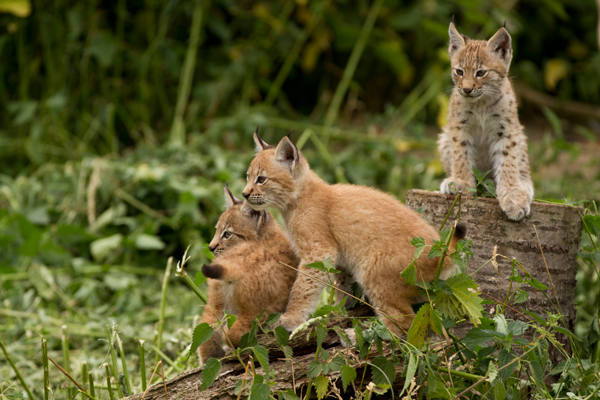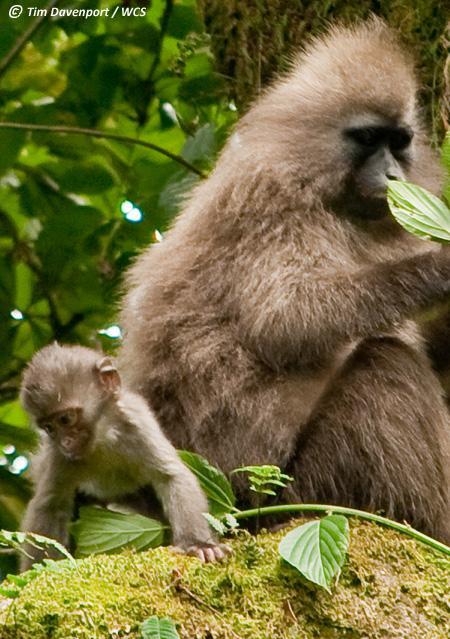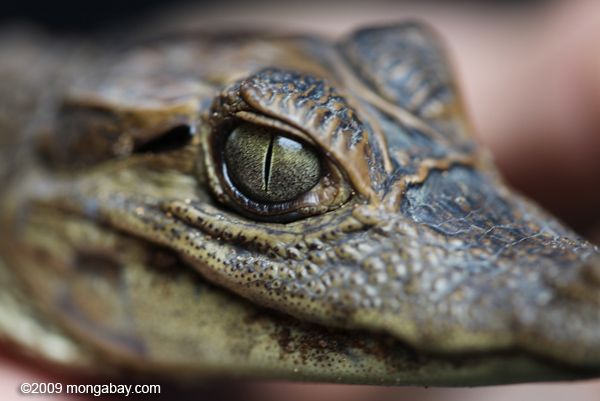Meet Max: the 285 lbs baby
A 285 lbs baby Asian elephant (Elephas maximus), that is. Max was on his feet in just a few minutes and entertaining his keepers and elephant family with his independent and playful nature. Max is now three weeks old and zookeeper Stefan Groeneveld said: “[He] has come on so much in just three weeks and is already showing an independent streak. He’ll happily leave his mum’s side to go and play in the paddock with the rest of the...
Lynx triplets make their appearance at ZSL Whipsnade Zoo
By Natalie Millar At eight weeks old, the three lynx kittens Ruby, Amber and Opal finally made themselves known to the public, playing in the enclosure under the watchful eye of mother, Maja. Lynx litters usually remain inside a den constructed by the female until they’re big enough to venture outside, at around seven weeks old. With their characteristic ear tufts, the playful lynx kittens are frequently spotted napping on logs...
Endangered Malayan tapir baby born at Minnesota zoo
Last Saturday, a female Malayan tapir (Tapirus indicus) was born at the Minnesota Zoo, the first baby tapir for the zoo in over 20 years. “Malayan Tapirs are an endangered species and every birth is important to the population,” said Tom Ness supervisor of the zoo’s Tropics Trail at the Minnesota Zoo, located in Apple Valley. The only tapir species found outside of Central and South America, Malayan tapirs are...
Oh deer: world’s smallest deer born at Queen’s Zoo
By Alexander Holmgren The first week of July marked one of the as the World’s cute as the worlds smallest deer was born in the Wildlife Conservation’s Society Queen’s Zoo. The doe, a member of the endangered Pudu species (Pudu puda) weighs approximately one pound at birth and will only grow up to be twenty pounds as an adult. The Pudu are one of nature’s most extraordinary creatures. The Pudu is the smallest deer species in existence...
Meet the baby kipunji: first photo of little-known monkeys’ offspring
By Brandon Allen A Kipunji (Rungwecebus kipunji) infant was just born in Tanzania this month, an important addition to the critically endangered monkey species. The Kipunji is the first new species of monkey to be discovered since 1923. Originally scientists had assumed that this unique primate was a mangabey, an endangered population of Old World monkeys that live in African rainforests. However, DNA tests revealed that the Kipunji...
Tiger Cub Caught on Camera
Written by Jemma Smith This image of a 4-5 month old tiger cub was recently captured on a remote camera in the India’s Bhadra Tiger Reserve. The Bhadra reserve was identified by the Wildlife Conservation Society (WCS) as one of 42 ‘source sites’ that are essential for the future of tigers. These sites are found within 9 different countries and are home to 70% of the remaining tiger population; although only make up 6% of their range....
Young sun bear takes to the trees (video)
A five-month old orphaned sun bear, Natalie, at the Bornean Sun Bear Conservation Center explores the trees. The sun bear (Ursus malayanus) is listed as Vulnerable by the IUCN Red List. It is threatened by deforestation, the illegal pet trade, poaching, and the trade for traditional Chinese...
Photo: close-up baby caiman
Close-up of a baby caiman in Costa Rica. Photos by Rhett A. Butler.
Photo: baby Mini-Nubian Goat
Mini-Nubian Goat. Photo by Julie Larsen Maher © Wildlife Conservation Society Spot is a Mini-Nubian Goat born at the Tisch Children’s Zoo at the Wildlife Conservation Society’s Central Park Zoo. Named for the white spot on his head, the mini-Nubian goat is just two weeks old and can be seen running around the petting yard and greeting visitors with tiny bleating sounds. Spot, with his parents, and other members of the goat family can...
Hairy elephant-relative with baby
This bizarre animal, resembling a rodent, in Kenya is a southern tree hyrax (Dendrohyrax arboreus). Although the size of rabbit, the hyrax is actually closely related to the elephant and belongs to the Afrotheria clade that includes not only elephants, but manatees, sengis, tenrecs, and aardvarks. Four species of hyrax survive today. Photo by: Rhett A. Butler. Click to see more photos of...
Elephant pair at the Chobe River
As the day ends numerous herds of Africa elephants (Loxodonta africana) come down to the Chobe River to drink and socialize. African elephants are listed as Vulnerable by the IUCN Red List. They are threatened by habitat loss, poaching, and human-elephant conflict. On the positive side, African elephant populations are viewed as increasing on the continent. Photo by: Tiffany Roufs. Click to see more photos of...









